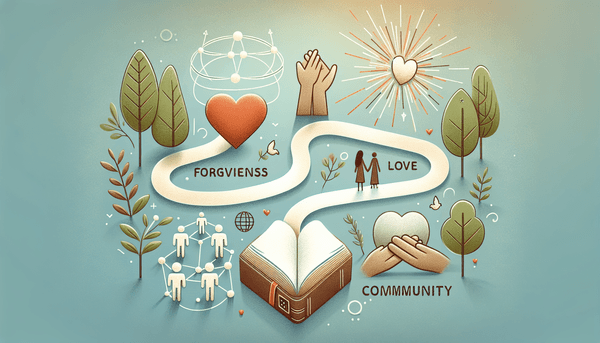The Distinction Between Forgiveness and Reconciliation
The Christian faith holds forgiveness and reconciliation in high regard, yet they serve distinct roles in our spiritual and emotional lives. Forgiveness, as Ephesians 4:32 suggests, is an act of kindness, tenderheartedness, and a reflection of the grace we have received in Christ. It is a decision to let go of bitterness and the thirst for retribution against those who have wronged us, a crucial step for our own healing. Reconciliation, however, requires a restoration of trust and often a mutual willingness to rebuild a fractured relationship. While forgiveness is a personal endeavor, reconciliation is a collaborative process that may not always be feasible or safe. Romans 12:18 advises us to live at peace with everyone, as much as it depends on us, indicating that while we strive for harmony, there are limitations that we must acknowledge, and sometimes reconciliation may not be the appropriate course of action.
Facing Opposition and Finding Community
Within any community, especially a faith-based one, opposition can arise, challenging our resolve and questioning our pursuits. When our goals, gifts, or endeavors differ from those around us, we may encounter resistance or even outright hostility. It is crucial, however, to maintain our commitment to the path God has set before us, as seen in Matthew 5:44, which teaches us to love our enemies and pray for those who persecute us, suggesting a higher calling to respond with compassion rather than retaliation. To foster community amidst such trials, we can turn to Hebrews 10:24-25, which encourages us not to give up meeting together, but to spur one another toward love and good deeds. In doing so, we strive for unity and understanding, even when faced with opposition, knowing that our shared faith and love in Christ should bridge the gaps that divide us.
Personal Healing from Hurt and Embracing Self-Worth
Healing from hurt is an integral part of the Christian experience, and it often begins with recognizing our worth in the eyes of God. Psalm 147:3 reminds us that God heals the brokenhearted and binds up their wounds, offering solace and restoration to those in pain. As we confront heartbreak and disappointment, it is important to remember that our value is not determined by human opinion but by the fact that we are fearfully and wonderfully made, as stated in Psalm 139:14. Embracing this truth empowers us to move forward with confidence in our unique gifts and calling, even when faced with criticism or rejection from others within our community. For a deeper understanding of ancient texts that have influenced Christian beliefs, consider exploring the Book of Enoch.
Surrendering to God's Care and Wisdom
One of the most profound acts of faith is surrendering our struggles and concerns to God's care. 1 Peter 5:7 encourages us to cast all our anxiety on Him because He cares for us. In doing so, we acknowledge that we are not alone in our trials and that God's wisdom far surpasses our own. Prayer becomes our lifeline, allowing us to communicate our fears and seek the peace of God, which transcends all understanding as described in Philippians 4:7. Entrusting our lives to God's will can bring a sense of peace and security, even amidst life's storms, as we rest in the assurance of His unfailing love and providence.
Conclusion
As we conclude, it is clear that the journey of faith requires us to grapple with the complexities of forgiveness, reconciliation, and community. By understanding the biblical principles surrounding these concepts, we can navigate the challenges that arise with grace and wisdom. Forgiveness is an essential practice for our own spiritual well-being, while reconciliation, though desirable, may not always be attainable. Moreover, building a community that reflects the love of Christ involves facing opposition with love and perseverance. Through it all, we are reminded of the peace and transformation that come from laying our burdens at the feet of Jesus and embracing the unity He desires for His people.
FAQ
Q: Does forgiveness require reconciliation?
A: Forgiveness does not necessarily require reconciliation. Forgiveness is a personal decision to release bitterness, while reconciliation involves restoring a relationship and may not always be possible or appropriate.
Q: Is it wise to reconcile with those who harbor hate towards us?
A: Reconciliation with those who harbor hate towards us should be approached with caution and wisdom. It may not always be possible or safe, and it is important to seek guidance and set healthy boundaries.
Q: How can I come together with others in community when there’s frequent opposition?
A: Building community amid opposition involves humility, grace, and a willingness to understand others. Seeking common ground, focusing on shared faith, and encouraging one another can foster unity and peace.
Q: Why is community and unity emphasized in the Bible?
A: Community and unity are emphasized in the Bible because they are seen as vital aspects of living out our faith, reflecting Christ's love, and supporting one another in spiritual growth and good deeds.






